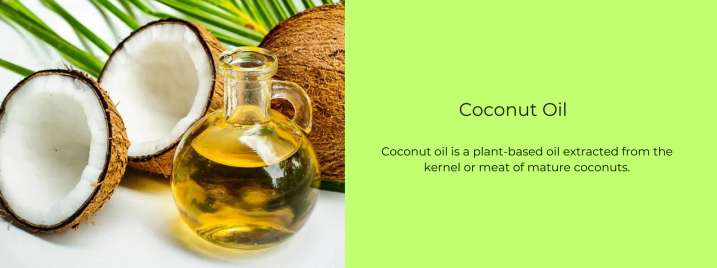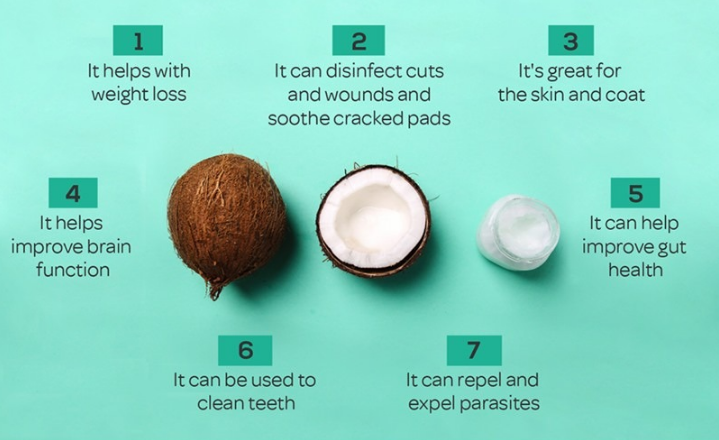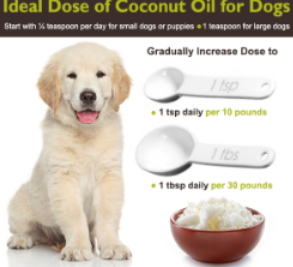Sep 18, 2025
Author:Jackson Watson

Dog owners are seeking natural methods to improve the health of their dogs. Coconut oil for dogs is one of the most common household products that may raise some questions. Being marketed as a superfood to humans, coconut oil has entered the pet care industry with claims of promoting healthy skin, better digestion, and even reducing allergies.
However, the question is, is coconut oil good for dogs? Although vets admit that it can bring some advantages, it should be taken properly to prevent possible side effects. This guide on coconut oil for dogs will discuss all you need to know about this nutritional supplement and its health effects, including risks, dosage, and safe usage.

Coconut oil is produced using the white flesh of coconuts that are grown on the coconut palm tree. It has been valued over the centuries to be used in cooking, beauty care and wellness practices. Pet owners are interested in the nutritional composition of coconut oil. It consists of saturated fats (over 90 percent), and a considerable quantity of medium-chain triglycerides (MCTs).
The ingredients of coconut oil are:
● Lauric acid - known to have natural antimicrobial, antiviral, and antifungal activity.
● Capric and caprylic acids - these are antifungal supports and can be used to decrease yeast growth.
● Polyunsaturated and monounsaturated fats - associated with better brain, heart, and general metabolic health.

Here are the benefits of coconut oil for dogs:
Many pet parents are concerned with dry, scaly, or itchy skin. Topical application of coconut oil can hydrate the skin of your dog, decrease dandruff flakes, and give your dog a shiny coat. It also has antibacterial properties and is used by some of the owners to calm hot spots, bug bites, or minor wounds.
Coconut oil, in small quantities incorporated in a dog's food, can aid in better digestion. The MCTs enhance nutrient absorption, gut inflammation and can assist in the alleviation of constipation. According to some vets, it is recommended for dogs with mild digestive problems.
Dogs may have environmental or food allergies that lead to itchy skin and long-term irritation. Coconut oil, when used topically as a natural anti-inflammatory agent, may be beneficial in relief, but oral supplementation can enhance the immune system.
The MCTs in coconut oil can be useful to older dogs, as they are associated with brain performance and energy. MCTs help older dogs remain more vigilant and active. If you are caring for a senior pup, take a look at senior dog care tips.
Lauric acid, which is antifungal, antiviral, and antibacterial, is found in coconut oil. This help to treat yeast infections on the skin or paws, as well as the immune system.

While many owners try coconut oil for dogs to support digestion, an overdose of coconut oil can easily lead to an upset stomach in your dog. The side effects include loose stools, diarrhea, and greasy stools. This is why it is important to regulate the amount of coconut oil added to your pet's routine.
Coconut oil is rare to cause an allergy or sensitivity to some dogs. It can be itchy, rashy or difficult to breathe. You should always begin with small quantities and watch your dog's activities.
Dogs with pancreatitis, obesity, or metabolic disorders should not take coconut oil. It is unsafe without the approval of a veterinarian because it contains a lot of fat that can aggravate these problems. Healthier oils, such as fish oil or flaxseed oil, can be substitutes for such dogs.

In small dogs, veterinarians prescribe 1/4 teaspoon per day, and up to 1 teaspoon per 10 pounds of body weight in large dogs. Do not leap to full portions simultaneously- gradual adjustment will reduce the risk of digestive disturbances.
Coconut oil is most readily administered by adding it to normal meals of your dog. Some dogs like to lick it right out of the spoon, yet combining it with the food guarantees better intestinal absorption and less risk of stomachache. For feeding consistency, check how much dog food by weight your pup really needs.
Take a small portion of coconut oil and apply it to the dry areas, cracked paws, or any irritated areas. Massage in a light manner so that it does not leave behind an oily texture. Always watch your dog after this, as most of them will attempt to lick it off.
Coconut oil is not the correct option for all the pups, and in certain circumstances, it may harm the pup more than benefit him. Dogs with a history of pancreatitis should avoid it because the high level of fats can cause flare-ups. If your dog has an issue with obesity or weight management, weight control can be even more challenging when you introduce oils that contain a lot of calories.
Coconut oil is not beneficial for dogs with sensitive stomachs that cannot process fats properly, because this can lead to diarrhea or vomiting. A small quantity of coconuts may irritate the skin, cause itchiness or digestive discomfort in dogs that are known to be allergic to coconuts. Never add coconut oil or any supplement to the diet of your dog without consulting your veterinarian.
Although coconut oil can be used to supplement your dog's health, it is most effective when used in a balanced diet. It is important to feed on time and offer the right nutrition.
At this point, an automatic pet feeder will be a savior. For example, WOpet Automatic Pet Feeder will make sure your dog does not skip a meal and always eats the appropriate amount. You can program a series of feedings, portions, and even a voice message to call your dog at mealtime.
Combining measured food with natural supplements such as coconut oil can be used to maintain weight, a shiny coat, and overall well-being at the right level.
Fish oil, unlike coconut oil, contains important omega-3 fatty acids, which promote brain activity, cardiac activity, and joint movement. It is among the most prescribed supplements by veterinarians.
Another safe substitute that helps in the health of the coat and aids in digestion is olive oil. It is lighter than coconut oil and may be a good option with dogs that tend to gain weight.
Flaxseed oil contains plant-based omega-3s that help to keep the coat shiny and reduce inflammation. It is useful in dogs with mild skin sensitivities.
The majority of veterinarians suggest that coconut oil may be safe in small doses, but it cannot be called an ideal solution. They emphasize that much of its claimed benefits in dogs have little scientific support. Although some dogs may experience improved coat shine, slight skin irritation, and better digestion, others might not react positively.
Seek advice from your veterinarian before adding coconut oil, particularly when your dog has underlying health conditions. They can prescribe alternatives that are safer or modified doses, depending on your dog's needs.
Coconut oil can be a good addition to the good health of your dog. It hydrates the skin, may have energizing effects, and provides some digestive support. It does not suit every dog and when overused, it can lead to health complications.
The combination of supplements to a balanced diet, regular feeding routines, and gadgets like the WOPET Automatic Pet Feeder can be the foundation of long-term health and happiness of your pet.
Label:
Popular Post

What to Feed a Sick Dog With No Appetite? [2025 Guide]
May 16, 2023

Troubleshooting Common Issues with Automatic Pet Feeders: Tips & Tricks for Pet Owners
Oct 26, 2023

What is a standard Cat Weight chart by age Kg?
Mar 19, 2025

Why Does My Cat Cough After Drinking Water? 8 Potential Reasons
Mar 13, 2023

Why is My Cat Throwing up Water? Top 5 Causes Here
Feb 08, 2023
$109.99
$129.99
Copyright © 2025 WOPET. All Rights Reserved.